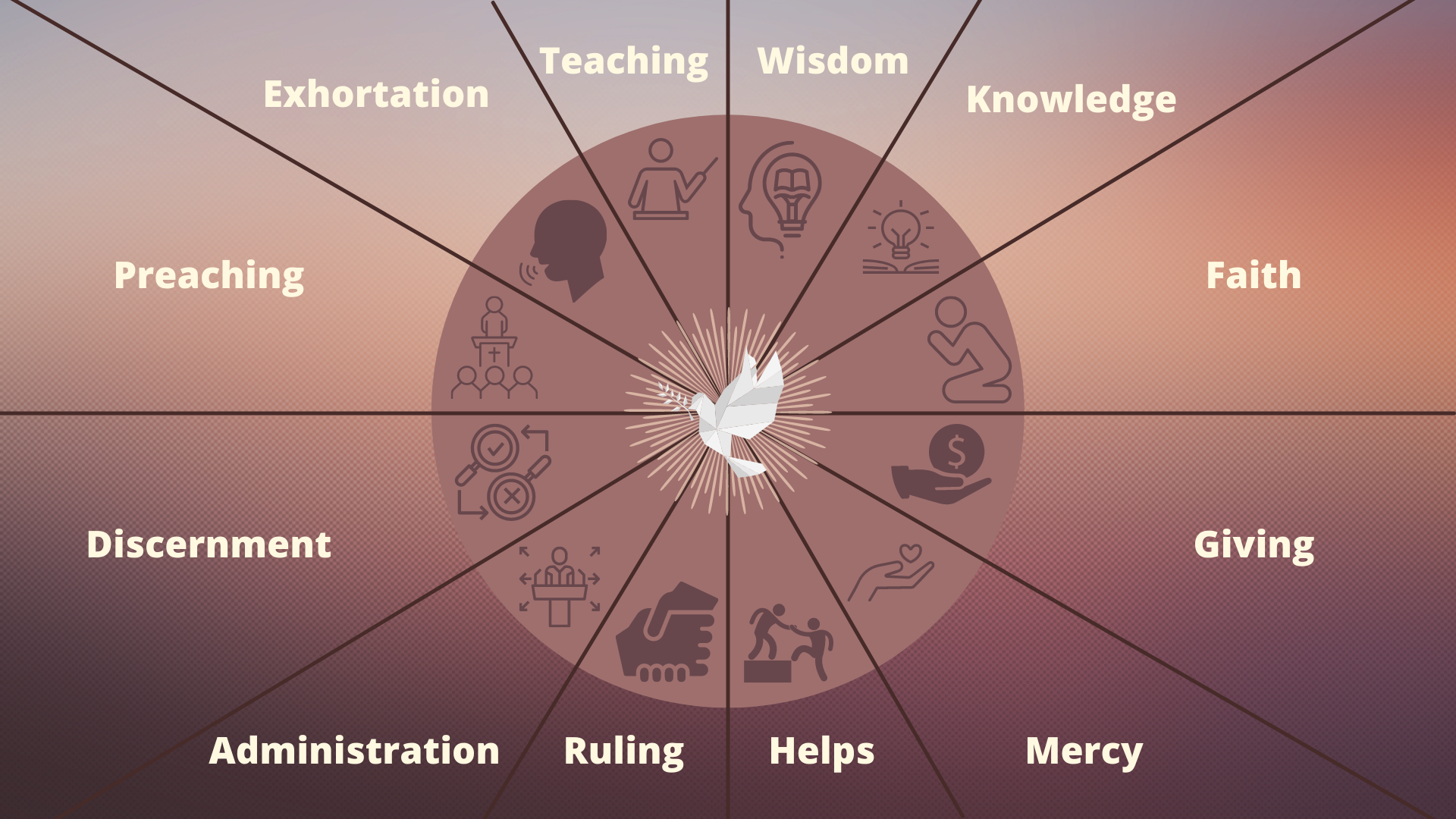The Gifts & The Body 25: Koinonia Culture Part 3
Vengeance and the Attributes of God
Omniscience- God knows the entire situation completely, even down to the intentions of each person's heart.
Justice- God knows the exact measurements of the wrong for all parties involved. He is not swayed by opinion and He cannot be "paid off" to render a false verdict.
Goodness- God is compassionate, especially to the wrong-doer! His vengeance against them is tempered with His goodness so that His wrath is exact, not excessive.
Eternality- God has seen every wrong imaginable. He sees our current situation. He promises a complete vindication!
Mercy- God has been wronged in every possible way. Every sin is first and foremost a sin against Him. It is always personal. He is able to sympathize with those who have been wronged because He has been there to a greater degree.
The Gifts & The Body 24: Koinonia Culture Part 2
The Body & The Gifts 23: Koinonia Culture Part 1
"The word “spirit” (pneuma (πνευμα)) refers to the human spirit as that part of man which gives him God-consciousness, or to the attitude or disposition of a man, as “that man’s spirit is good,” or to the Holy Spirit. The definite article appears before it in the Greek text. The absence of the Greek definite article emphasizes character.
If that were absent here, the reference would be to the disposition or attitude of a person. The presence of the article points to the Holy Spirit. It is the locative of sphere. That is, Paul exhorts to fervency in the Christian life which is engendered by the Spirit, not produced by the flesh (self-effort)."
The Body & The Gifts 22: The Spiritual Gift of Mercy
The Gift of "Mercy"- "the outward manifestation of pity; it assumes need on the part of him who receives it, and resources adequate to meet the need on the part of him who shows it."
W. E. Vine, Merrill F. Unger, and William White Jr., Vine’s Complete Expository Dictionary of Old and New Testament Words (Nashville, TN: T. Nelson, 1996), 403.
The Gift of "Mercy"- "to feel sympathy with the misery of another, especially such sympathy which manifests itself in action, less frequently in word."
Kenneth S. Wuest, Wuest’s Word Studies from the Greek New Testament: For the English Reader, vol. 1 (Grand Rapids: Eerdmans, 1997), 107.
The Spiritual Gift of Mercy-
The God-given ability to be sensitive or empathetic to people who are in affliction or misery and to lift internal burdens with cheerfulness. (Romans 12:8)
Perceptive to people in need
Find it hard to say “no” when asked to help
Jump in quickly to help – sometimes without evaluating fully
Lay aside personal desires and personal plans to help others
A peacemaker
Avoid arguments or controversial situations
Rely heavily on feelings (sometimes hold them inside)
Love people despite their faults
Cheerful
Try to find the best in people without doubting them
"Mercy is a form of love determined by the state or condition of its objects. Their state is one of suffering and need, while they may be unworthy or ill-deserving. Mercy is at once the disposition of love respecting such, and the kindly ministry of love for their relief."
John Miley, Systematic Theology, Volume 1 (New York: Hunt & Eaton, 1892), 209.
The Body & The Gifts 21: The Spiritual Gift of Leading
The Gift of "Leading"- proistemi-
①.- to exercise a position of leadership, rule, direct, be at the head (of)
②.- to have an interest in, show concern for, care for, give aid
"The ability to govern others without 'lording' leadership over them." -Woodrow Kroll
"Administrations" (1 Cor 12:28)- kubernesis- "indicates varieties of such leading positions in the ecclesial body of Christ" (p. 573).
This is the only occurrence of this word in the New Testament.
The one with the gift of administration "is a helmsman who steers a vessel, and thus this gift consists in managing and directing others whether officially as presbyters, pastors, or bishops or in unofficial ways. Some men and some women of the church, including even young people, have this gift to a marked degree and profit the church not a little by rightly putting it to use." -Lenski
The Spiritual Gift of Leading (Administration)-
The God-given executive ability to lead people with care, while collecting data, setting policy, and developing plans which will guide a course of action with skill and wisdom (Romans 12:8; 1 Corinthians 12:28).
Assumes responsibility and stays on course until the work is accomplished
Guides the efforts of the team on a project
Develops, follows, and/or creates efficient plans
Confronts people enthusiastically with the ability to confer, negotiate, and supervise in delegating responsibilities
Good organizational skills, getting a high level of efficiency out of people and resources
Remains calm in spite of obstacles, finding creative new approaches when needed
Expresses opinions freely
"Necessary to the work of the church is the leadership given to it by God. In keeping with this need, the gift of administration and ruling is sovereignly bestowed upon a few (Rom 12:8; 1 Cor 12:28). It is clear that all Christians are on the same level of privilege in spiritual things, but in the providence of God some are given places of great authority. To those possessing the gifts of administration and ruling all Christians should give proper heed, being exhorted to observe such gifts and honor them by obedience (Heb. 13:7)."
John F. Walvoord, The Holy Spirit (Galaxie Software, 2008), 169.
The Body & The Gifts 20: The Spiritual Gift of Giving
The Gift of "Giving"- metadidomai- "give (a part of), impart, share."
Ex.- "that I may impart some spiritual gift to you" (Rom 1:11b).
"Liberality"- haplotes- "simplicity, sincerity, uprightness, frankness" - ‘without strings attached’, ‘without hidden agendas’ -p. 104
“'Liberality' means generosity that is free of any self-serving motive." -Constable
William Arndt et al., A Greek-English Lexicon of the New Testament and Other Early Christian Literature (Chicago: University of Chicago Press, 2000), 638.
The Spiritual Gift of Giving- Radmacher
The God-given ability to make and to give things most liberally and beyond all human expectation. (Romans 12:8; 1 Corinthians 13:3)
Dislike emotional appeals, wants the facts
Ability to invest wisely
Set and achieve long-range goals
Use resources to get the most out of them
Work to aid those needy people who are worthy of assistance
Determines merits of a project before investing or getting others to invest
Dislikes waste
Make decisions quickly, but holds back when uncertain
"A believer with the gift of giving has the capacity to give of his substance to the work of the Lord or to the people of God consistently, liberally, sacrificially, and with such wisdom and cheerfulness that others are encouraged and blessed."
William J. McRae, The Dynamics of Spiritual Gifts (Grand Rapids, MI: Zondervan, 2010), p. 50-51.
The Body & The Gifts 19: The Gift of Exhortation
The Gift of "Exhortation"- parakaleo - verb.
①. to ask to come and be present where the speaker is, call to one’s side
②. to urge strongly, appeal to, urge, exhort, encourage
③. to make a strong request for something, request, implore, entreat
④. to instill someone with courage or cheer, comfort, encourage, cheer up
5. treat someone in an inviting or congenial manner
The Gift of "Exhortation"- paraklesis -noun.
①. act of emboldening another in belief or course of action, encouragement, exhortation
②. strong request, appeal, request
3. lifting of another’s spirits, comfort, consolation
Parakletos- "called to one's aid in a judicial sense" used when speaking of the Holy Spirit ("Helper"- John 14:16, 26; 15:26; 16:7) and Jesus Christ ("Advocate"- 1 John 2:1).
The God-given ability to draw alongside of someone in order to comfort, to encourage, to rebuke, and to lead into insight toward action. (Romans 12:8)
People-centered
Stick with people through thick and thin
See creative alternatives when facing problems
Enjoy people, understand their feelings and attitudes
Can be confrontative without being offensive
Comfortable in either group or one-on-one setting
Not easily discouraged, persistent
See problems and struggles as an opportunity for growth
Have a deep concern for people who are going through difficulties
"If you suspect you may have the gift of exhortation (too often exercised as the gift of criticism!), then you need to know the Scriptures well in order to exhort correctly, both in the content and spirit of the exhortation."
"As a part of the work of preaching, exhortation fills an important place. Differing from teaching in that it is an appeal for action, exhortation is the practical aspect of a preaching ministry. Some are given special gift in this work, enabling them to lead Christians into the active realization of the will of God."
Into the Unknown (Guest Speaker)
Acts 15:35-16:10
The Body & The Gifts 18: The Gift of Teaching
The Gift of "Teaching"- didaskon- "instruction, clear explanation" of a doctrine or text. This will be accompanied by a systematic approach and development of a passage or subject while also driving home an application for those who hear.
Radmacher- "The God-given ability to lay down in systematic order the complete ladder of a doctrine and to apply it incisively and diligently to life. (1 Cor. 12:28-29; Romans 12:7).
Employ a logical, systematic approach to Biblical study
Heavy emphasis on responsible action in light of what is known
Ability to explain things clearly and concisely
Summarize, evaluate, or pick out main points in a presentation quickly
Set an example in behavior (a model for others)
Careful in study
Give attention to detail
Like to be prepared, to avoid impromptu situations
Prefer group settings to one-on-one settings





